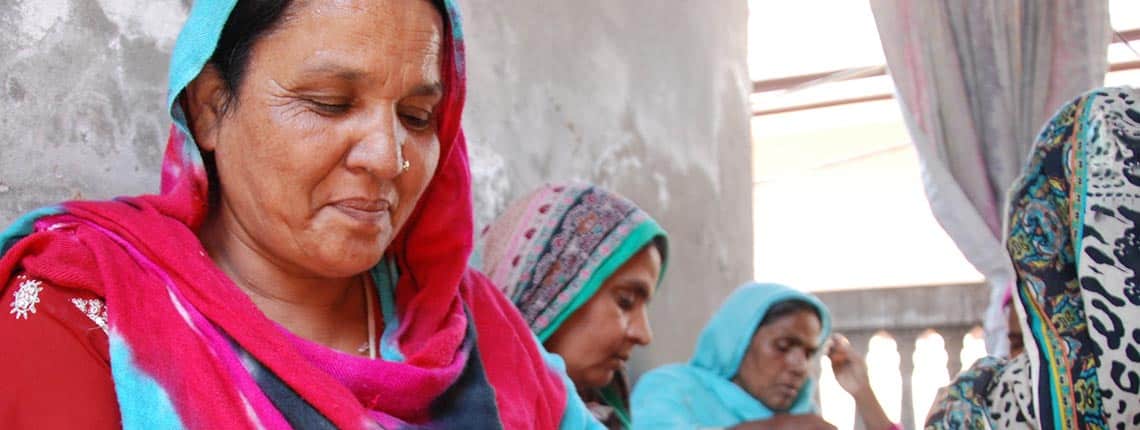Thousands of home-based workers spread across Pakistan’s Sindh province achieved a historic victory in May 2018 with the enactment of the Sindh HomeBased Workers Act – the first piece of legislation in South Asia solely for home-based workers.
The Act was the result of more than two decades of organizing and advocacy, and gives approximately 5 million home-based workers in Sindh the right to unionize and bargain collectively, social protection, and access dispute resolution mechanisms.
Here is how they did it.
Home-based workers in Pakistan work in different industries, making garments, carpets, sacks, incense sticks, footballs, embroidery, bangles, jewelry, shoes and food. Work is done for domestic and global supply chains. These home-based workers are employed by factories or workshops through contractors or intermediaries and paid by the piece. They operate out of their homes or places near their homes.
Home-based workers are treated as independent contractors or micro-businesses even though, in reality, they are disguised employees. They do not have employment contracts, enforceability of minimum wages, access to social security entitlements such as pensions, health coverage or maternity benefits, or access to dispute resolution mechanisms. They bear additional production costs such as the cost of workspace, equipment, materials, electricity and transportation.
The exact number of home-based workers in Pakistan is unclear. Official numbers from 2017/18 suggest that there were 2.47 million home-based workers in non-agricultural employment, but this figure may not include all home-based workers. Informal estimates suggest a much higher number, approximately 20 million.
House by House
In 2011, realizing that legal rights for home-based workers would not be enacted if home-based workers remained invisible, activists and trade unionists in Pakistan started establishing contact with home-based workers by going house to house and asking workers to tell them about other home-based workers.
Activists and unionists decided to establish cooperatives where home-based workers could freely discuss their issues, work together, develop their skills and advocate for their rights. The workers had a broad range of concerns beyond a minimum wage, social security and their legal recognition as workers. They also discussed everyday concerns, including transport, electricity, housing security and violence against women. The home-based workers started approaching Labour Department officials, the Social Security Institute, and the Workers Welfare Board with their concerns about wage payments and social security.
When the organizing strength of home-based workers was built through these cooperatives, they reached out and consulted with allies to decide the next steps to strengthen their legal position. It was at this point, in discussions with the National Trade Union Federation (NTUF), that the idea of forming a trade union took root. Relying on the constitutional right guaranteed under Article 17 that allows anyone to form an association or union, they applied to become a union. Three different unions were formed in 2009, two in Quetta and one in Hyderabad.
In that same year, the Home-Based Women Workers Federation (HBWWF) registered as a federation - an overarching network for the unions - with 1,000 members. Today, HBWWF has more than 4,000 members.
Legal Recognition
Building on years of organizing by home-based workers within the Federation, HBWWF began advocating for provincial legislation in Sindh in 2010, because the province has a particularly active trade union movement and a favourable political climate, with political parties including working-class representatives.
The result of their advocacy, the Sindh Home-Based Workers Act, 2018, was a significant achievement: it gives homeworkers legal recognition as “employees” and has widespread implications as it applies to all sectors and has the potential to reach many home-based workers. The Act gives approximately 5 million home-based workers in Sindh the right to unionize and bargain collectively, social protection, and access dispute resolution mechanisms.
Seeking Enforcement
While the enactment of the legislation is cause for celebration, the struggle for the realization of workers’ rights continues.
One of the first steps in implementing the Act is identifying and registering workers, and it is only after this that they can access social protection. The first home-based worker was registered in December 2020, 2 years after the legislation had been passed. The delay in registration meant that home-based workers could not access the government’s emergency cash transfers during the COVID-19 pandemic and ensuing restrictions.
The inclusion of social protection is significant, although its implementation is pending as the labour laws require amendment to reflect this change.
The establishment of a Council for Home-based Workers – responsible for monitoring and overseeing the identification and mapping of home-based workers, and the registration of home-based workers and employers – and the Arbitration Committee are two other components awaiting implementation.
More work remains to be done, but the steps taken by HBWWF thus far are crucial in advancing their advocacy of ratifying and realizing the rights prescribed to home-based workers under the ILO Homework Convention (C177).
This blog is a summary of WIEGO Organizing Brief 13, released in December 2022 and written by Zehra Khan, HBWWF General Secretary and Krithika A. Dinesh, an Indian lawyer and researcher working with the Law Programme at WIEGO.
